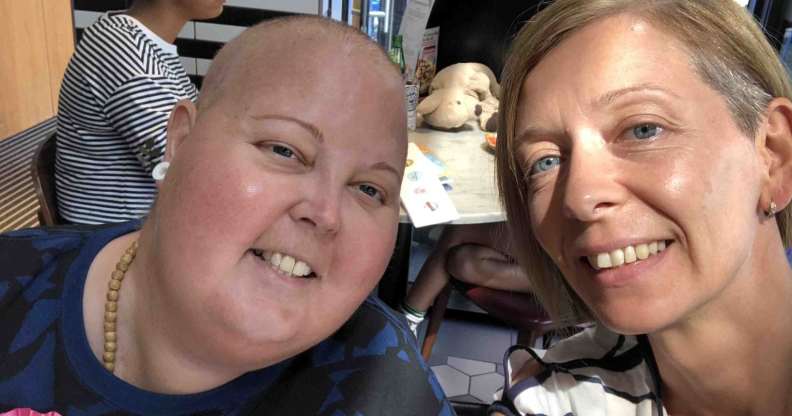Gay woman makes urgent plea to save her partner with extremely rare brain tumour

Sarah (L) recently celebrated her 34th birthday with Laura (R) (Courtesy of Laura Clarke)
A gay woman is appealing to the generosity of family, friends and strangers to fund a last-chance and potentially life-saving treatment for her partner, who is suffering from a rare form of brain tumour.
Sarah Tebbutt and Laura Clarke have been together for seven years and spent the last four years living in Spain and working as teachers.
Tebbutt, whom Clarke described as “adventurous, kind and gentle,” was first diagnosed with a lymphoma in the sternum for which she received chemotherapy and radiotherapy and was eventually declared cancer-free in December. Then, one February morning, she woke up with a paralysed leg.

Laura (L) and Sarah (R) moved to Spain four years ago to work as teachers (Courtesy of Laura Clarke)
“She had sensation but she just could not move it. I took her to A&E and she was diagnosed within a couple of hours with a brain tumour,” Clarke told PinkNews.
Tebbutt received one round of chemotherapy and five sessions of radiotherapy, but then developed grade 4 sepsis, a life-threatening infection. Her cancer treatment needed to be halted until she recovered from sepsis. By the time she took a MRI scan to see if she could continue her chemotherapy treatment in June, her situation had rapidly deteriorated.
“The results were devastating. The scan showed multiple tumours in Sarah’s left lung with one large tumour located in the left lung. Multiple tumours showed up in each of her kidneys alongside her brain tumour which had increased in size too,” Clarke described in the GoFundMe campaign page.
Doctors in Spain told Tebbutt she could continue chemotherapy, but it wouldn’t cure her. The couple then left everything behind and moved back to the UK, so that Tebbutt could be close by her family, while researching other treatment options.
Immunotherapy could provide the cure Tebbutt needs, but she’ll have to undergo it privately because free trials aren’t available to people with a rare condition like hers.
The crowdfunding effort aims to raise £104,000 to fund two years of immunotherapy treatment that could extend Sarah’s life expectancy and chances of survival. Clarke’s efforts have so far raised nearly £7,500 in the first week, mostly through family, friends and friends of family.
The first goal for the couple would be raising £20,000, which would enable Tebbutt to start the treatment and receive the first six injections—one every three weeks—before undergoing a scan to see how her body is responding to the drug.
“If she’s got a good response, they continue with the treatment which could be up to two years—we’re trying to raise £104,000 because that would cover the whole treatment. We can obviously refund the money if we don’t need it but the fact is, if we only raise the first initial payment and it is successful, then we wouldn’t have money to continue the treatment,” Clarke told PinkNews.

The couple celebrating Pride in happier times (Courtesy of Laura Clarke)
The couple met through a dating site seven years ago and soon after moved in together in Brighton. “We had the same ambitions in life, she wanted to travel and so did I, so we bought a camper van and we traveled. We packed up our house in Brighton and drove all the way through France and Spain,” Clarke said.
The two women were active in the LGBT+ community, volunteering for MindOut, a LGBT+ mental health service. They ran a marathon in 2012 to raise funds for the charity.
“Sarah still had the ambition she wanted to run another marathon before she was 30, so she ran another one two years later, in 2014—I didn’t do that one. She’s very sporty, she’s a PE teacher, the fittest person you could imagine. She’s never touched any drugs, she’s never smoked, she’s led a very healthy life,” Clarke said.

The couple needs to raise at least £20,000 to begin the first phase of the treatment (Courtesy of Laura Clarke)”It’s just really sad to sit and look at her and see such a gentle person going through what she’s going through,” she added.
Until they raise the money to start the treatment, Tebbutt is taking a medication that should stem the spread of cancer. She celebrated her 34th birthday last week, even though the passing of time is causing the couple apprehension.
“Time is passing and that’s what makes us scared. We know it’s an aggressive tumour that is growing quick and spreading. We’ve been back here four weeks without any treatment and she’s already grown a new tumour on her pancreas within four weeks.,” Clarke said, adding” “She feels it’s a ticking time-bomb.”

